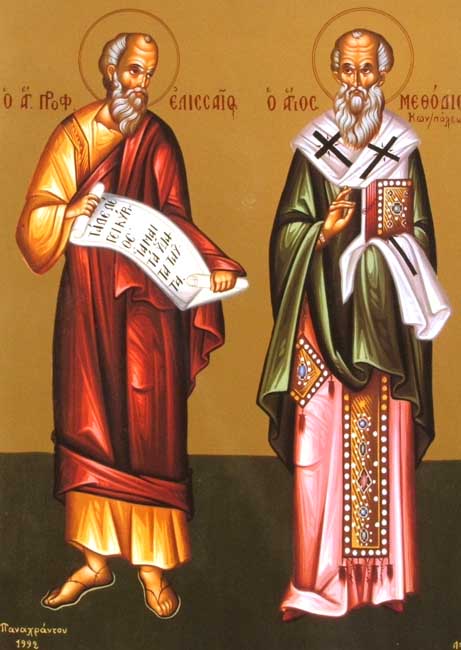The Holy Prophet Elisha.
Elisha lived nine hundred years before
Christ. When the Lord willed to take the aged Prophet Elijah to
Himself, He revealed to him that He had designated Elisha, the son of
Shaphat of the tribe of Reuben from the town of Abel-Meholah, as his
successor in the prophetic service. Elijah informed Elisha of God's
will and draped him with his mantle and implored from God the
two-fold grace of prophecy for him. Elisha immediately departed his
home and family and followed Elijah. When the Lord took Elijah in a
fiery chariot, Elisha remained to continue the prophetic service with
yet a greater power than Elijah.
By his purity and zeal, Elisha was
equal to the greatest prophets and, by the miraculous power that was
given to him by God, Elisha exceeded them all. He parted the waters
of the Jordan as Moses once parted the Red Sea; the bitter waters in
Jericho he made drinkable; he brought forth water into the excavated
trenches during the war with the Moabites; he multiplied the oil in
the pots of the poor widow; he resurrected the dead son of the
Shunammite woman; he fed a hundred people with twenty small loaves of
bread; he healed Commander Naaman of leprosy; he invoked leprosy upon
his servant Gehazi because of his greed; he blinded the entire Syrian
army and also forced another army to flee; he foretold many events to
the people as well as to individuals. Elisha died at a very old age.
Our Holy Father Methodius, Patriarch of Constantinople.

Methodius was born in the town of
Syracuse in Sicily. After the completion of his secular studies, he
was tonsured a monk and began to live a life of asceticism in a
monastery. Patriarch Nicephorus took him into his service. During the
reign of the iconoclastic emperors, he became widely known as a
superb defender of the veneration of icons. For this, the wicked
Emperor Theophilus exiled him to an island with two common criminals
where he languished in a damp prison for seven years without light
and without sufficient food as though in a grave. During the time of
the pious Empress Theodora and her son Michael, Methodius was freed
and was chosen as patriarch (according to an earlier prophecy of St.
Joannicius the Great). The first week of the Great Fast [Lenten
Season] Methodius solemnly carried the icons into the church and
wrote a Canon in honor of icons. Unable to outwit him, the vile
heretics hired a woman who declared that the patriarch had an impure
relationship with her. The whole of Constantinople was horrified at
this slander. Nevertheless, not knowing how he could otherwise prove
his innocence, the patriarch overcame his embarrassment, removed his
clothes and stood naked before the court which he himself had
requested, and showed his withered body, debilitated from fasting.
The court was clearly convinced that the patriarch had been
slandered. Hearing of this, the people rejoiced and the heretics were
shamed. Then, the woman admitted that she was persuaded and paid to
bring this slander against the saint of God. Thus, those who thought
to bring shame upon Methodius unintentionally increased his fame.
This great confessor of the Faith died peacefully in the year 846
A.D. and took up habitation in the Kingdom of God.
No comments:
Post a Comment